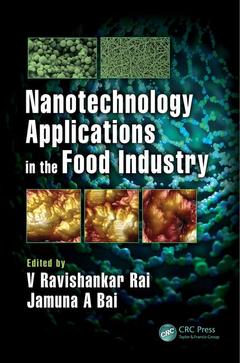Description
Nanotechnology Applications in the Food Industry
Coordinators: Rai V Ravishankar, Bai Jamuna A
Language: English
Subjects for Nanotechnology Applications in the Food Industry:
· 17.8x25.4 cm · Hardback
Description
/li>Contents
/li>Readership
/li>Biography
/li>
Nanotechnology is increasingly used in the food industry in the production, processing, packaging, and preservation of foods. It is also used to enhance flavor and color, nutrient delivery, and bioavailability, and to improve food safety and in quality management. Nanotechnology Applications in the Food Industry is a comprehensive reference book containing exhaustive information on nanotechnology and the scope of its applications in the food industry. The book has five sections delving on all aspects of nanotechnology and its key role in food industry in the present scenario. Part I on Introduction to Nanotechnology in Food Sector covers the technological basis for its application in food industry and in agriculture. The use of nanosized foods and nanomaterials in food, the safety issues pertaining to its applications in foods and on market analysis and consumer perception of food nanotechnology has been discussed in the section. Part II on Nanotechnology in Food Packaging reviews the use of nanopolymers, nanocomposites and nanostructured coatings in food packaging. Part III on Nanosensors for Safe and Quality Foods provides an overview on nanotechnology in the development of biosensors for pathogen and food contaminant detections, and in sampling and food quality management. Part IV on Nanotechnology for Nutrient Delivery in Foods deals with the use of nanotechnology in foods for controlled and effective release of nutrients. Part V on Safety Assessment for Use of Nanomaterials in Food and Food Production deliberates on the benefits and risks associated with the extensive and long term applications of nanotechnology in food sector.
Part I Introduction to Nanotechnology in the Food Sector Chapter 1 Development of Bio-Based Nanostructured Systems by Electrohydrodynamic Processes Chapter 2 Carbon Nanomaterial-Based Fertilizers Can Improve Plant Growth Chapter 3 Nanomaterials in Food Applications Chapter 4 Market Potential of Food Nanotechnology Innovations Part II Nanotechnology in Food Packaging Chapter 5 Nanomaterials Applicable in Food Protection Chapter 6 Use of Nanopolymers, Nanocomposites, and Nanostructured Coatings in Food Packaging Chapter 7 Starch Nanocomposite Films for Food Packaging Chapter 8 Electrospun Nanofibers: Development and Potential in Food Packaging Applications Part III Nanosensors for Safe and Quality Foods Chapter 9 Nanosensors in the Food Industry Chapter 10 Applications of Aptamers to Nanobiosensors and Smart Packaging Part IV Nanotechnology for Nutrient Delivery in Foods Chapter 11 Nanoemulsions Produced by Low-Energy Methods: Fundamentals and Food Applications Chapter 12 Application of Nanotechnology in the Safe Delivery of Bioactive Compounds Chapter 13 Electrospinning of Edible, Food-Based Polymers Chapter 14 Role of Polymeric Nanoparticles in Nutraceutical Delivery Chapter 15 Nanoemulsions and Nanodispersions: A Fundamental View of Their Preparation, Characterization, Stability Evaluation, and Application Chapter 16 Lipid Nanocarriers for Phytochemical Delivery in Foods Chapter 17 Role of Bioactive Compounds to Improve Nanomechanical Properties and Functionality of Polymeric Vehicles Chapter 18 Microscopy Techniques for Structural Characterization, Evaluation of Nanomechanical Properties, and Biosensing of Food Systems Chapter 19 Chitosan Micro- and Nanoparticles for Vitamin Encapsulation Chapter 20 Nanoparticle Nutrient Carriers Chapter 21 Electrospinning and Electrospraying Technologies and Their Potential Applications in the Food Industry Part V Safety Assessment for Use of Nanomaterials in Food and Food Production Chapter 22 Advanced Approaches for Efficacy Evaluation and Risk Assessment of Nanomaterials in Food Chapter 23 Effect of Nanoparticles on Gastrointestinal Tract Chapter 24 Regulatory Framework for Food Nanotechnology
V Ravishankar Rai earned his MSc and PhD from the University of Mysore, India. Currently, Dr. Rai is working as a Professor in the Department of Studies in Microbiology, University of Mysore, India. He was awarded a fellowship from the UNESCO Biotechnology Action Council, Paris (1996), the Indo-Israel Cultural Exchange Fellowship (1998), the Biotechnology Overseas Fellowship, Government of India (2008), and the Indo-Hungarian Exchange Fellowship (2011) Indian National Academy Fellowship (2015) and Cardiff Incoming Visiting Fellowship (2017). Presently, he is the coordinator for the Department of Science and Technology, Promotion of University Research and Scientific Excellence and University Grants Commission innovative programs.
Jamuna A. Bai has completed her MSc and PhD in Microbiology from University of Mysore, India. She is working as a Researcher in UGC sponsored University with Potential Excellence Project, University of Mysore, India. She has previously worked as ICMR Senior Research Fellow and carried a research work on food safety, role of quorum sensing and biofilms in food-related bacteria and developing quorum-sensing inhibitors. Her research interests also include antimicrobial application of functionalized nanomaterials against food-borne pathogens.
These books may interest you

Food Applications of Nanotechnology 177.10 €



